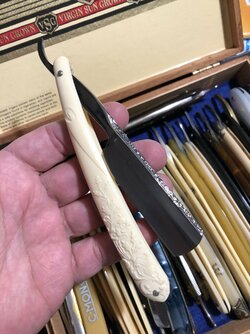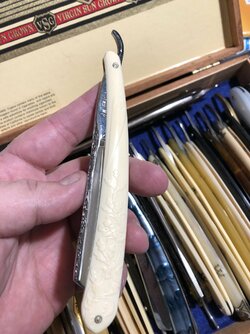I have had this la legende 1884 thiers issard razor for several years now and the scales have always had a strong smell or odor to them. I am not the best at descriptions but smells similar to a menthaltum rub or something medicinal. The odor permeates through everything around it. The scales are decorative and I’m pretty sure the manufacture is well after celluloid use or any others that break down. No damage to the razor or any around it for years so doesn’t seem to harm steel. But does anyone have any idea what causes this or experienced similar? It is a gorgeous razor but the stink of it bugs me.
You are using an out of date browser. It may not display this or other websites correctly.
You should upgrade or use an alternative browser.
You should upgrade or use an alternative browser.
Smelly scales - TI la legende 1884
- Thread starter LJS
- Start date
The scales are likely celluloid. Celluloid is manufactured with the use of Camphor as a plasticizer. If the scales are very strong smelling you might want to be wary of potential off-gassing or cell rot in the future.
From Wiki:
The most inherent flaw is as celluloid ages, the camphor molecules are ‘squeezed’ out of the mass due to the unsustainable pressure used in the production. That pressure causes the nitrocellulose molecules to bind back to each other or crystallize, and this results in the camphor molecules being shoved out of the material. Once exposed to the environment, camphor can undergo sublimation at room temperature, leaving the plastic as brittle nitrocellulose. Also, with exposure to excess heat, the nitrate groups can break off and expose nitrogen gases, such as nitrous oxide and nitric oxide, to the air.
From Wiki:
The most inherent flaw is as celluloid ages, the camphor molecules are ‘squeezed’ out of the mass due to the unsustainable pressure used in the production. That pressure causes the nitrocellulose molecules to bind back to each other or crystallize, and this results in the camphor molecules being shoved out of the material. Once exposed to the environment, camphor can undergo sublimation at room temperature, leaving the plastic as brittle nitrocellulose. Also, with exposure to excess heat, the nitrate groups can break off and expose nitrogen gases, such as nitrous oxide and nitric oxide, to the air.
- Thread starter
- #3
Appreciate the reply, but this is not a vintage razor which is what puzzles me. I probably have hundred plus old razors with celluloid scales and have seen cellrot first hand plenty.
But as best as I know, no one produces celluloid modern scales…..or do they? That is what I don’t get. On top of that, the smell is so strong it is surprising. Much more than the cellrot smell. And not affecting steel whatsoever after years. And I mean years in a cigar box with maybe 30-40 other nice steel razors.
Jury is still out. I would be surprised if a modern razor has celluloid scales but I won’t swear it doesn’t. And also wondering if anyone has experienced any kind of scales with such a strong odor. They are pretty so I hate to toss.
But as best as I know, no one produces celluloid modern scales…..or do they? That is what I don’t get. On top of that, the smell is so strong it is surprising. Much more than the cellrot smell. And not affecting steel whatsoever after years. And I mean years in a cigar box with maybe 30-40 other nice steel razors.
Jury is still out. I would be surprised if a modern razor has celluloid scales but I won’t swear it doesn’t. And also wondering if anyone has experienced any kind of scales with such a strong odor. They are pretty so I hate to toss.
wierd my Peacock scales have no smell?
can't believe I sniffed scales!!!! the things we do.
camo
can't believe I sniffed scales!!!! the things we do.
camo
I’d think if something is giving off a strong odour over a long period of time, something is breaking down within it.
On a less serious note, if it’s nitrous oxide as mentioned above, inhale deeply and you’ll be laughing..
On a less serious note, if it’s nitrous oxide as mentioned above, inhale deeply and you’ll be laughing..
Appreciate the reply, but this is not a vintage razor which is what puzzles me. I probably have hundred plus old razors with celluloid scales and have seen cellrot first hand plenty.
But as best as I know, no one produces celluloid modern scales…..or do they? That is what I don’t get. On top of that, the smell is so strong it is surprising. Much more than the cellrot smell. And not affecting steel whatsoever after years. And I mean years in a cigar box with maybe 30-40 other nice steel razors.
Jury is still out. I would be surprised if a modern razor has celluloid scales but I won’t swear it doesn’t. And also wondering if anyone has experienced any kind of scales with such a strong odor. They are pretty so I hate to toss.
Celluloid is still manufactured for a variety of goods and it even easily obtainable in sheet from from places like Rothko and Frost. Italy used to be a big player for Celluloid in Europe but most now comes from the Far East.
If the scales smell like Camphor (think Vicks Vaporub) they are Celluloid.
Having played guitar for a long time I have a whole bunch of modern manufactured guitar picks made of the stuff, when you rub one vigorously against a cloth or pant leg it gives off a strong Camphor smell. I've even set one on fire and they burst into a strong, hot flame which is another indicator of genuine Celluloid. (Don't try that).
Just because a razor is modern production means nothing as far as potential materials for scales. As I said above, Celluloid is still manufactured and some razor makers may still have stock of materials from decades past.
If they are continuously emitting a strong odor, personally, I would be concerned.
Last edited:
Steve56
Ask me about shaving naked!
Modern steel maybe, but you don’t know how many decades the scales have been in the warehouse.
Could you post a said picture of the razor so we can see it.
If the scales are plastic and have a strong smell, something chemical is going on, and I wouldn’t want it near my blades.
If you can smell them they are off gassing. That means they are breaking down.
If you can smell them they are off gassing. That means they are breaking down.
Many older razors were produced with celluloid scales. That was one of the earliest types of plastics. It is a flammable material produced from nitrocellulose with camphor as a plasticizer. Because of the reactivity of nitrocellulose, it is subject to celluloid rot. The camphor imparts a distinctive aroma.
Another common material used for scales was hard rubber. Early rubber was produced from the resin from rubber trees. Sulfur was used to harden the rubber. Thus, scales made of rubber often smell similar to car tires.
Another common material used for scales was hard rubber. Early rubber was produced from the resin from rubber trees. Sulfur was used to harden the rubber. Thus, scales made of rubber often smell similar to car tires.
- Thread starter
- #11
I don’t know what it is, but it doesn’t have the normal camphor smell of celluloid, but it is similar enough it bugs me. Here’s a couple pics if that helps any. But I’m pretty sure these were a limited run in the past 10-12 years with a more modern steel even. I’ll try and send a note to TI, but I haven’t heard of any modern razors with celluloid.




I don’t know what it is, but it doesn’t have the normal camphor smell of celluloid, but it is similar enough it bugs me. Here’s a couple pics if that helps any. But I’m pretty sure these were a limited run in the past 10-12 years with a more modern steel even. I’ll try and send a note to TI, but I haven’t heard of any modern razors with celluloid.
View attachment 1410753View attachment 1410754
Limited run past decade/modern steel/ don't mean squat. Scales could be NOS from earlier days in TI's history, they've been around a long time, probably got a lot of old materials hanging about.
We've given you advice, and you can ignore it (and your senses) or not, your choice.
Any plastic giving off a Camphor aroma (or something very close) it is very, very, very likely to be Celluloid since it's the only polymer I am aware of made with Camphor in it's formulation.
Most modern plastics used for scales are petroleum based and would not give off such a smell.
I've noticed a lemony, chemical-like smell when sanding particular scales from the early to mid 20th century. Scales from Case, Genco, Shumate, etc. It's almost a musky smell, like someone mixed Old Spice and lemon Pine sole together. At first I thought it was just an after-effect from the previous owner using the razor, but I've experienced it multiple times since then, so it has to be the material the scales were made from. The models were Genco/Case's "Easy Aces" and Shumate's "Professional For Barbers", among others. Has anyone else noticed this smell while working on similar razors?
- Thread starter
- #14
FWIW, Thiers-Issard did reply and said that these are not celluloid acetate (they were more precise with the acetate). Beats me, but quacks a lot like a duck. No metal issues, just the odd smell. I have plenty of experience with cell-rot on old razors and will just have to watch it like any other I guess.
If anyone else actually has this razor/scale combo, would love to hear from you.
If anyone else actually has this razor/scale combo, would love to hear from you.
mine doesn't smell as mentioned previously......

camo
camo
I have got a TI razor with the exactly same scales. I bought it new about eight years ago. The scales one my razor are absolutely scent free (yes you made me go and smell on a razor). I'd say that the scales aren't celluloid but plain plastic.I don’t know what it is, but it doesn’t have the normal camphor smell of celluloid, but it is similar enough it bugs me. Here’s a couple pics if that helps any. But I’m pretty sure these were a limited run in the past 10-12 years with a more modern steel even. I’ll try and send a note to TI, but I haven’t heard of any modern razors with celluloid.
View attachment 1410753View attachment 1410754
Talking about smelly scales, over the years I've really come to l appreciate the feline smell of older ebonite scales. It takes some getting used to, but after that it turns into a symbol of times long gone, a time before modern plastic.
Anyhow even plastic can have some smell initially, but it soon goes away. My guess is that you got a specimen that where made quite recently, or that at least the scales were.
Similar threads
- Replies
- 4
- Views
- 3K
- Replies
- 11
- Views
- 8K


